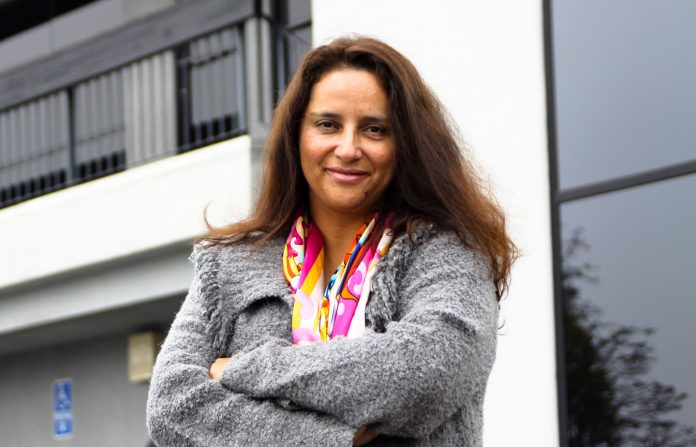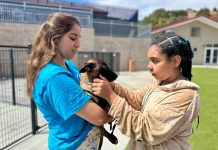
Editor’s Note: The following profile is an excerpt from Amy Wu’s upcoming book, “From Farms to Incubators: Women Innovators Revolutionizing How Our Food is Grown,” which tells the stories of women entrepreneurs who are transforming agriculture through high technology.
Martha Montoya never imagined that her journey from Bogota, Colombia, to California would take her into a thriving agtech career. Montoya is founder and CEO of AgTools Inc., a food supply platform offering real-time news and information to farmers and agriculture buyers, on everything from distribution to pricing. The company’s product aims to help growers, especially small farmers, manage market volatility, increase profitability, and reduce food waste in the supply chain.
Montoya compares AgTools’ subscription-based platform — which can be accessed through mobile apps — to the Bloomberg terminal, a computer software system issued by Bloomberg LP that provides financial data. In fact, AgTools takes account of some 67 variables, including politics, weather, travel, commodity prices and farming infrastructure.
The information is curated by a team of AgTools’ representatives and country managers, many of whom are scientists, researchers and agronomists. They pull the data from a variety of sources, including the Federal Departments of Agriculture, Transportation and Defense.
Montoya is fast talking, fast moving and dynamic and appears very quick to respond to rapid changes and challenges.
She grew up in an upper-middle-class family in Colombia. Her father founded the first night schools in Bogota offering continuing education for the capital city’s working people. She recalls traveling easily between the city’s relatively wealthy and impoverished neighborhoods — an experience that informs her current work. She planned to follow her father’s footsteps in education, and graduated with a degree in biology and chemistry from La Salle University in Colombia with plans to be a teacher. She was also a competitive tennis player during college and competed throughout South America in her youth.
With political strife and drug cartels wracking Colombia, Montoya left in 1989. At 25 and newly married, she initially passed through Los Angeles on her way elsewhere. Later, homesick for a community of Colombians, she returned to Los Angeles and settled in Orange County, Calif.
Montoya attributes her work ethic to her father, whose mantra was that no assignment was out of the realm for her, “as long as you work and they pay you.” Even as she applied for jobs, she cleaned houses. Through classified ads she found a position at a school library.
In a bit of a twist, it was her passion for cartooning (at one point she wanted to be a professional cartoonist full time) that led her to agriculture. She did find some success in cartooning and in 1995 licensed her cartoon characters in a comic strip named “Los Kitos.” The comic strip ran in a handful of newspapers, including La Opinión. But the gig was not enough for her bread and butter. She answered an advertisement from a trade company seeking a receptionist, figuring the job would afford her the time to pursue her cartooning outside of work.
In reality, the job extended far beyond answering phones and included buying ingredients globally. The position utilized her knowledge of chemistry, language, and her love for travel and working with folks from all over the world. Montoya built a vast network in the agricultural sector, especially in Latin America. It helped that she’s bilingual in English and Spanish.
In 2010, she returned to agriculture and founded Los Kitos Produce and Farms (named after her famed cartoon strip) in the City of Orange. That same year Walmart hired her as a supplier to source fruits and vegetables from smaller farmers.
“Every time we had a crop, I would think about the social ramifications of that crop and the impact to society,” Montoya recalls. She saw first-hand the struggles faced by growers, especially small farmers, including lack of up-to-date and relevant information. She began brainstorming ways to help.
She enlisted her brothers, both with engineering backgrounds, to help build the platform. She started AgTools in 2017 and introduced the company’s product the following year, at the Produce Marketing Association’s annual conference.
So far, AgTools has been sold to some 20 fruit and vegetable shippers and producers. The company works with up to 17 industries, including transportation, banking, insurance and government. AgTools is available in English, Spanish and Portuguese.
In 2019 Montoya partnered with Charter Communications and the Western Growers Association in Salinas to launch a pilot program that trains female farmers to use AgTools on their farms. In October 2019, Montoya held a training session with the pilot group of farmers in Gonzales, a city just south of Salinas.
Says Montoya: “The bottom line is: can they make more money with this tool?” She notes that female farmers remain a minority in the Salinas Valley and throughout California. If successful, Charter may help extend the program to several hundred female farmers.
Covid-19 did not appear to stop Montoya’s plans as she stepped up raising capital for the company. In March 2020, AgTools won a $250,000 award from the San Diego Angel Conference held at the University of San Diego. AgTools also launched its new slogan “See More | Achieve More.”
Montoya said sales and interest were growing rapidly due to Covid-19, growers and shippers globally, including the U.S., were demanding more information to make decisions to lead them to be more productive and efficient. In June 2020, AgTools won the Fly Wheel Investment Conference that came with a $125,000 investment award.
Agtech’s female entrepreneurs continue to face barriers, Montoya observes, including capital, age, experience, sex and race.
“The investment world believes more in younger generations with ideas than mature, seasoned businesspeople. Add in factors of gender and race, and our opportunities for funding are much smaller,” says Montoya, a baby boomer. Her key to success has been finding other women and other non-traditional investors who believed in the cause. Luckily, there are many of them.
This profile is based on an article published in a series about female innovators in agtech in Techonomy in 2019, a digital publication that focuses on technology in society. Amy Wu is an award-winning journalist and author of “From Farms to Incubators,” scheduled to be released on May 4 by Linden Publishing. For more information, go to farmstoincubators.com.













